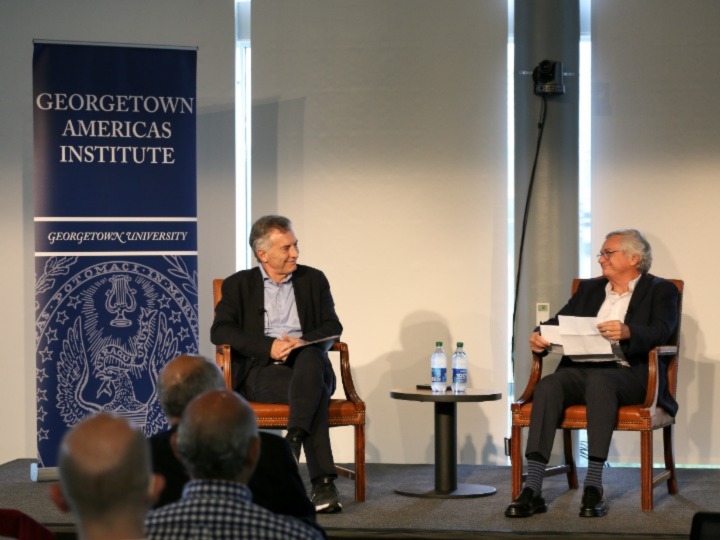Mauricio Macri and Moisés Naím Reflect on Latin America’s Political and Foreign Policy Challenges
On September 26, the Georgetown Americas Institute hosted a conversation between the former president of Argentina, Mauricio Macri and author and journalist Moisés Naim on political and foreign policy challenges in Latin America.

Recent years have seen significant political shifts as citizens, frustrated with traditional leaders' inability to deliver a higher standard of living, are turning towards nontraditional and anti-establishment politicians. In a recent GAI event, author Moises Naím and former Argentine president Mauricio Macri reflected on the implications of these changing trends, the future of Latin America’s democracy, and the policy challenges the region faces. The event was co-sponsored by the Latin American Policy Association and the Latin America Leadership Program.
Democratic Crisis
In his opening remarks, Naím highlighted the underperformance of democracies in Latin America, especially of the three biggest countries: Brazil, Mexico, and Argentina.
“Democracy needs to be fixed. But that does not mean it should be thrown away.”
Naím also mentioned the threat of populism to democracy while referencing his book, The Revenge of Power: How Autocrats are Reinventing Politics for the 21st Century (2022).
Likewise, Macri noted that democracy could not be rushed and that a true democratic process takes time, while warning about the popularity of clientelism and fragmentation in the Western Hemisphere.
In addition, he signaled technology and the rapid spread of misinformation as a detrimental factor to democracy.

International Cooperation
Macri also stressed the importance of international relations in today’s globalized world, as he raised that “there is no more room for an isolated country.”
“It is important to have a relationship with any country,” he mentioned. “We need the help of the whole world,” he asserted when asked about Argentina’s foreign policy.
In a time of important political transitions in the region, he urged for the new leaders to be highly motivated to keep their countries’ best interests in mind.
Argentina’s Challenges
The former president reflected on his own country and raised the challenges of inflation, poverty, and criminality as some of the most pressing issues Argentina is facing. Looking forward, Macri pointed to the capitalization on Argentina’s vast natural resource, currency reform, and a focus on rule of law to attract foreign investors and advance Argentina’s political and economic goals.
